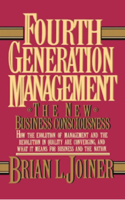Blog posts on organization as a systemPosts selected fromManagement Blog - Engineering Blog - Investing Blog and other blogs - Dangers of Forgetting the Proxy Nature of Data
 We use data to act as a proxy for some results of the system. Often people forget that the desired end result is not for the number to be improved but for the situation to be improved. We hope, if the measure improves the situation will have improved. But there are many reasons this may not be the case (one number improving at the expense of other parts of the system, the failure of the number to accurately serve as a proxy, distorting numbers, etc.).
I find something I learned from Brian Joiner an excellent summary – which I remember as:
Data (measuring a system) can be improved by
- distorting the system
- distorting the data or
- improving the system (which tends to be more difficult though likely what is desired)
Brian Joiner’s book, 4th Generation Management is a great book for managers.
continue reading: Dangers of Forgetting the Proxy Nature of Data - Operational Excellence
Saying the organization is focuses on new principles (partnering, lean, etc.) is not the same as applying those principles with the great success that Toyota does. That difference is huge and is driving many companies to outsource and try to dramatically cut costs. Reducing costs should be the outcome of improving efficiency.
Toyota is successful manufacturing in the USA.
...
I would agree that many companies don’t understand the critical importance of management excellence. Rather than take the difficult path to lead real change in their organization they focus on simple cost cutting measures (though usually not cutting executive salaries which have grown dramatically and are excessive in the USA compared to the rest of the world). That won’t work. continue reading: Operational Excellence - Performance without Appraisal
 In the short article Performance Without Appraisal: What to do Instead of Performance Appraisals, Peter wrote:
Dr. Deming said of Performance Appraisals, “Stop doing them and things will get better.” He was correct. Many organizations, however, wonder what to do instead.
For those that do require “some alternative” Peter included some good ideas in The Leader’s Handbook(see chapter 9 “Performance without Appraisal pages 293 to 368). This chapter has excellent material for any manager. continue reading: Performance without Appraisal - Targets Distorting the System
 I still remember Dr. Brian Joiner speaking about process improvement and the role of data well over a decade ago. He spoke of 3 ways to improve the figures: distort the data, distort the system and improve the system. Improving the system is the most difficult. continue reading: Targets Distorting the System - Could Toyota Fix GM
Yes, Toyota could fix GM. Even the right leaders and managers, within GM, could fix GM but it is a huge long term job and it would be harder to do it internally because you will have to do it while competing with Toyota. Also they have some difficult issues to deal with since their previous managers did not tihnk of the long term (20-50 years out from the decisions they were making in the 70s though 90s).
I wouldn’t buy GM if I were Toyota, though. Why bother. Just grow Toyota, it is working very well so far. It makes sense to buy if you need to grow quickly to gain critical mass, or you will lose the opportunity to grow early in a fast moving market. High tech companies (like Cisco and Intel) often do well buying other companies – but just as often high tech companies make more mistakes buying than is justified by the successes. continue reading: Could Toyota Fix GM - Management is Prediction
I believe Deming’s thoughts about prediction are most effectively put into action using the PDSA cycle. Specifically, you must predict the results in the planning phase (prior to piloting improvements). I find that this is rarely done. I don’t think the form of that prediction is critical (narrative with loose numerical guesses, precise numerical prediction…). The critical issue is making the prediction, then comparing the results to that prediction and then figuring out how your original understanding can be improved based on the new data.
Learning will not only be about the specific case being examined, but also, over time, learning about your tendencies in prediction. continue reading: Management is Prediction - Deming’s Ideas at Markey’s Audio Visual
Mark Miller, General Manager, Markey’s Audio Visual spoke on Markey’s experience adopting Deming’s ideas.
- Markey’s needs to anticipate the changing needs of customers and anticipate those needs
- Unknown and unknowable – not really unknown just un-measurable (again taught to all employees)
- Gemba – where the real work gets done (the customer interaction – he stressed time and again that the key to their success was Markey’s employees interaction with customers – Markey’s aims to provide the best customer experience the customer has with any company)
- Break down barriers between departments – Markeys doesn’t charge internally. Indianapolis looses money – they own the high end equipment used by the other offices.
- Intrinsic motivation v. Extrinsic motivation – he has the chart from page 122 of New Economics in Deming’s handwriting on his wall.
continue reading: Deming’s Ideas at Markey’s Audio Visual - The Purpose of an Organization
W. Edwards Deming described the purpose of an organization in New Economics, on page 51, as:
The aim proposed here for any organization is for everybody to gain – stockholders, employees, suppliers, customers, community, the environment – over the long term. continue reading: The Purpose of an Organization - How Toyota Turns Workers Into Problem Solvers
This idea is simple. Creating an environment where this is actual the way things are, not just the way things are said to be, is difficult. That is why I believe so strongly in Deming’s management philosophy. The organization must be viewed as a whole. Benefits can be gained by adopting some concepts in a piecemeal manner. However, many benefits accrue only when the positive interactions between Toyota Production System (TPS – Lean) concepts occur (as systems thinking would predict). continue reading: How Toyota Turns Workers Into Problem Solvers - Performance Without Appraisal
The comments on the mini-microsoft blog shows performance appraisal continues to be an emotional topic. People on opposite sides of the debate are very passionate.
I admit it took me longer to accept Dr. Deming’s thoughts on performance appraisal than other ideas (and that is even with Peter Scholtes being a friend which gave me the opportunity to discuss the idea with him). So I understand it is not an easy concept to accept. continue reading: Performance Without Appraisal - Managing the Supplier Relationship, at Ford and Elsewhere
Ford said they were committed to the Deming philosophy in the 1980’s and 1990’s. Donald Petersen, former CEO of Ford Motor Company, was one of those included in the Deming Library Tapes.
Nothing has changed from 1990 to today [October 2005] that explains why Ford saying they are going to deal with suppliers differently now should work any better then such statements 15 years ago. Until they acknowledge what problems in their management system have caused them to fail to use sensible management practices that have been well know for decades I see no reason to believe their claims that they will behave differently this time. continue reading: Managing the Supplier Relationship, at Ford and Elsewhere - Lean Government
I was one of the founding board members on the ASQ Public Sector Network (now the ASQ Government Division). I also, created and have maintained the Public Sector Continuous Improvement web site for a decade (some additional details on my background).
There have been many great efforts in the government, but still so much more needs to be done.
Here are articles exploring what has been done:
continue reading: Lean Government - Measuring and Managing Performance in Organizations
measure [parameter] in the hopes of improving [goal]
When dysfunction occurs, the values of [parameter] go up comfortingly, but the values of [goal] get worse. Dysfunction often occurs. continue reading: Measuring and Managing Performance in Organizations - Toyota Engineers a New Plant: the Living Kind
Toyota’s vision:
First, making things that benefit both people and the world as a whole.
…
Second, as a member of society, we must fulfill our responsibilities to all stakeholders. We must provide to customers cleaner, safer, and more attractive products with excellent value. To shareholders, we must enhance share value through long-term and stable growth by increasing profits and paying appropriate dividends. With business partners, we must engage in fair business based on a spirit of mutual benefit.
To our employees, we must provide a workplace where they can work with pride based on mutual trust and responsibility between labor and management, and respect for people.
continue reading: Toyota Engineers a New Plant: the Living Kind - Marketing in a Lean Company
|